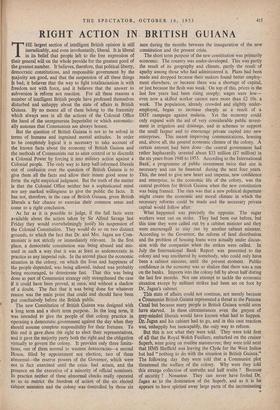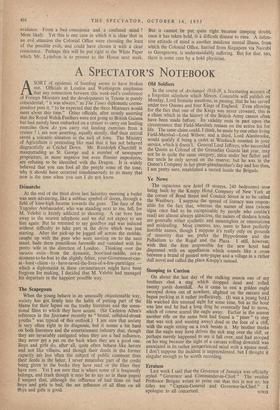RIGHT ACTION IN BRITISH GUIANA T HE largest section of intelligent
British opinion is still ineradicably, and even involuntarily, liberal. It is liberal in its belief that people left to the free expression of their general will on the whole provide for the greatest good of the greatest number. It believes, therefore, that political liberty, democratic constitutions, and responsible government by the rrajority are good, and that the suspension of all these things s bad; it believes that the way to fight totalitarianism is with eedom not with force, and it believes that the answer to subversion is reform not reaction. For all these reasons a number of intelligent British people have professed themselves disturbed and unhappy about the state of affairs in British Guiana. By no means all of them belong to the fraternity which always sees in all the actions of the Colonial Office the hand of the unregenerate Imperialist or which automatic- ally assumes that Communists are always honest.
But the question of British Guiana is not to be solved in terms of humane and ingrained mental attitudes. In order to be completely logical it is necessary to take account of the known facts about the economy of British Guiana and the methods of Communists out to seize control or to discredit a Colonial Power by forcing it into military action against a Colonial people. The only way to keep half-informed liberals out of confusion over the question of British Guiana is to give them all the facts and allow their innate good sense to form the right empirical judgment. But the truth of the matter is that the Colonial Office neither has a sophisticated mind nor any marked willingness to give the public the facts. It has not, therefore, in the case of British Guiana, given British liberals a fair chance to exercise their common sense and come to a right conclusion.
As far as it is possible to judge, if the full facts were available about the action taken by Sir Alfred Savage last Friday they would overwhelmingly justify his suspension of the Colonial Constitution. They would do so on two distinct grounds, to which the fact that Dr. and Mrs. Jagan are Com- munists is not strictly or immediately relevant. In the first place, a democratic constitution was being abused and mis- used in such a way that it was at least as undemocratic in practice as any imperial rule. In the second place the economic situation in the colony, on which the lives and happiness of the people depended, was being allowed, indeed was probably being encouraged, to deteriorate fast. That this was being done as part of Communist strategy only strengthened the case if it could have been proved, at once, and without a shadow of a doubt. The fact that it was being done for whatever reason was the main point that could and should have been put conclusively before the British public.
The new Constitution of British Guiana was designed with a long term and a short term purpose. In the long term, it was intended to give the people of that colony practice in operating a democratic government against the day when they should assume complete responsibility for their fortunes. To this end it gave them the right to elect their representatives, and it gave the majority party both the right and the obligation virtually to govern the colony. It provides only three limita- tions, one of them normal to western democracies—a second House, filled by appointment not election; two of them abnormal—the reserve powers of the Governor, which were not in fact exercised until the crisis had arisen, and the presence on the executive of a minority of official nominees. In practice neither of these abnormal checks really operated so as to restrict the freedom of action of the six elected cabinet ministers and the colony was controlled by those six men during the months between the inauguration of the new constitution and the .present crisis.
The short term purpose of the new constitution was primarily economic. The country was under-developed. This was partly the result of its geography and climate, partly the result of apathy among those who had administered it. Plans had been made and dropped because their makers found better employ- ment elsewhere, or because there was a shortage of capital, or just because the flesh was weak. On top of this, prices in the last few years had been rising steeply; wages were low— even now a skilled worker cannot earn more than £2 10s. a week. The population, already crowded and slightly under- employed, began to increase sharply as a result of a DDT campaign against malaria. Yet the economy could only expand with the aid of very considerable public invest- ment in irrigation and drainage, and in schemes to support the small farmer and to encourage private capital into new enterprises. This meant improving communications, housing and, above all, the general economic climate of the colony. A certain amount had been done—the central government had rather haphazardly invested about $33 million (£7 million) in the six years from 1948 to 1953. According to the International Bank, a programme of public investment twice that size is necessary and can be financed during the next four years. This, the need to give new heart and impetus, new confidence and enterprise, to the economic life of the colony, was the central problem for British Guiana when the new constitution was being framed. The idea was that a new political departure might create the economic and moral climate in which the necessary reforms could be made and the necessary private capital would follow after.
What happened was precisely the opposite. The sugar workers went out on strike. They had been out before, but this time they were called out by a cabinet minister and they were encourageil to stay out by another cabinet minister. According to the Governor, the reform of land distribution and the problem of housing loans were actually under discus- sion with the companies when the strikes were called. In July the international Bank Report was presented to the colony and was smothered by somebody, who could only have been a cabinet minister, until the present moment. Public confidence in the economy was so shaken that there was a run on the banks. Imports into the colony fell by about half during the last few months. Not one attempt to tackle the economic situation except by militant strikes had been set on foot by Dr. Jagan's cabinet.
This state of affairs could not continue, not merely because a Communist British Guiana represented a threat to the Panama Canal but because many people in British Guiana would soon have starved. In these circumstances even the greyest of grey-minded liberals would have known what had to happen. Dr. Jagan and his cabinet had to go, and in this case reaction was, unhappily but inescapably, the only way to reform.
But this is not what they were told. They were told first of all that the Royal Welch Fusiliers, embarked on the cruiser Superb, were going on routine manoeuvres; they were told next that HMS Sheffield was leaving the Clyde for the West Indies but had " nothing to do with the situation in British Guiana." The following day they were told that a Communist plot threatened the welfare of the colony. Why were they told this strange collection of untruths and half truths ? Because of security ? Nonsense. They can never have fooled Dr. Jagan as to the destination of the Superb, and as it is he appears to have spirited away large parts of the incriminating evidence. From a bad conscience and a confused mind ? More likely. Yet this is one case in which it is clear that in an evil situation the Colonial Office were choosing the least of the possible evils, and could have chosen it with a clear conscience. Perhaps this will be put right in the White Paper which Mr. Lyttelton is to -present to the House next week. But it cannot be put quite right because creeping doubt, once it has taken hold, is a difficult disease to cure. A defen- sive attitude of mind is another insidious mental illness, from which the Colonial Office, harried from Singapore via Nairobi to Georgetown, is understandably suffering. But for that, too, there is some cure by a bold physician.



































 Previous page
Previous page